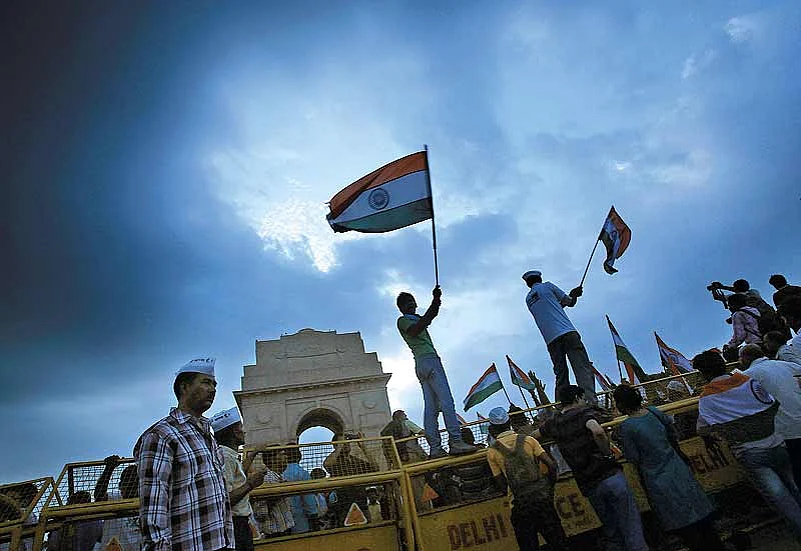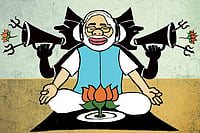Even in a year full of the weird, the bizarre and the farcical—think Mamata Banerjee walking out of a television show, accusing a college girl of being a Communist plant—one image stands out for its sheer absurdity: just retired chief of army staff V.K. Singh sharing the dais with Anna Hazare. General Singh, who fought a rearguard action in the final months of his long career to prove that he was born in a year different from that in the government’s files (which would have given him more time in service), was not expressing solidarity with armymen for better pay or pension. He wanted Parliament dissolved and elections called because the government was corrupt and unconstitutional.
Just days later, Singh joined up with Om Prakash Chautala—hardly a pillar of public probity—to now protest against a nuclear plant coming up in Haryana. Nothing in his career had shown that Singh had been principally anti-nuclear, but post-retirement he seems to be ready to join any anti-government bandwagon as long as it gets him some eyeballs. The irony of the situation seems to have completely escaped him. He is now among those agitationistas, like Baba Ramdev and Anna Hazare, who will go anywhere the crowds have gathered.

Ex-army chief Gen V.K. Singh at a farmers’ rally, Delhi, Dec 2012. (Photograph by Sanjay Rawat)
India seems to be fast becoming an irony-deficient nation and in the year just gone past the lack of this critical faculty has affected even those—the media, for instance—who ought to normally have it in spades. Healthy scepticism, a vital attribute for any journalist, has given way to credulity, or worse, naivete. Faux outrage alternates with po-faced piety, building up every sin of omission or commission (especially by that most reviled of species, the politician) to such Himalayan proportions that an alternate point of view appears to be heresy. The jugular must be attacked and the volume must be turned on to full pitch in every discussion; every evening the nation looks forward to its dose of moral indignation.
Except that in this annus absurdus, this fervour seemed to have gone missing when it was most needed. The death and subsequent funeral of Bal Thackeray brought out the inner softie and sentimentalist among cynical hacks who not only chose to treat the whole thing in terms of a personal loss but also discarded any sense of objectivity, balance and perspective. A man who had had no qualms about airing his views, however odious and politically incorrect they may have been, was portrayed as a jolly good chap with a remarkable proclivity for sharing a beer with journalists and prominent citizens. This portrayal of a deeply polarising man—whose partymen were indicted in the 1992-93 riots in Bombay, changing it for ever more—as a cuddly old gent not only flew in the face of journalistic objectivity but was disturbingly untrue. And yet this is the picture that millions of people around the country got, because the electronic media decided, almost en masse, that they would treat the death as a national loss of a mass icon.
When politicians become venal and the bureaucracy unresponsive, it is to the media that people turn for some guidance. When the media plainly deserts its post and stops speaking truth to power, ‘civil society’ steps in. And in 2011, it appeared, for a brief moment, that a genuine alternative voice, untainted and without any narrow, personal agenda was ready to emerge. The voice was shrill but perhaps that shrillness was needed because the political class had become tone-deaf and self-serving. An issue that troubled and affected everyone but which seemed forgotten was now back on the table; politicians were served notice that they could not dish out platitudes about corruption but would now have to do something concrete about it. The solutions that civil society offered were simplistic, even dangerous, but some good could come out of the churn. A rustic social worker and a perpetually angry former civil servant were the new heroes and could deliver us to a bribe-free world, or so the multitudes that came out on the streets hoped.
How quickly those hopes crashed and burned! Armed with moral certitudes but with no coherent plan except to hit out at everyone in sight, Anna Hazare and Arvind Kejriwal showed how poor strategy can kill a good idea. The inner contradictions and petty personal ambitions finally finished off the partnership that had at one time truly scared the government.

Modi supporters just can’t get enough of the mask, Dec 2012. (Photograph by Mayur Bhatt)
Till he declared that Robert Vadra was in cahoots with DLF to make money illicitly, Kejriwal was on the right track. The collective gasp after that claim showed that he had caught everyone’s attention; hardly anyone had had the temerity to go on a full frontal attack of the first son-in-law. (Vadra responded by creating a phrase that has become hugely popular, no small feat). Kejriwal’s case was strong and persuasive and at the very least raised suspicions about corporate and government malfeasance in showing undue favours to an influential businessman. The Congress was on the backfoot and a sustained campaign could have opened the Pandora’s box.
But a good leader and visionary knows when to go forth and when to slow down; Kejriwal’s allegations about all kinds of people became more and more outlandish and even if there was a grain of truth in any of them, there was just no evidence. His press conferences were still covered live, but the law of diminishing returns was setting in and soon came the time when he got relegated to the inside pages and the allegations were greeted with media silence. His sulk showed that uncritical media coverage was a big part of the Kejriwal gameplan; without television cameras, the campaign against corruption is nothing.
Will his political party take off and make an impact? That is a game that will require a different set of ideas. Now he cannot confine himself to pointing fingers—his prospective voters will ask about his plans to fight poverty, stand up for human rights, his views on environmental degradation. A political party cannot be a one-note wonder. It’s a moot question: will the Aam Aadmi Party still be worth writing about in the 2013 end-of-the-year reviews?
But while they may slowly fade away from the headlines, Hazare and Kejriwal have spawned a new culture—now every issue is discussed in extreme terms and that too by coming out on the streets. The national conversation is now conducted at a high decibel, echoed by breathless reporters and hyperventilating anchors. The more the crowds shout, the more OB vans land up and then the crowds shout some more. Everyone has understood this game.
The collective bloodlust of the middle-class Indian is a frightening new phenomenon. Brave Twitterevolutionaries and Facebook anarchists, from the safety of their homes in New Delhi or New Jersey, insist on summary justice. Castrate the rapists, hang the terrorist in the public square. It’s about vendetta, not justice. Often they do not even think about what they are shouting. As we saw in the dying days of the year, the mobs—both online and offline—were asking for more police, more cctvs, more security, tougher laws, all things the state likes to hear. More restrictive laws will be enacted, in response to public demand.
Already a creeping invasion of freedoms has begun. The Palghar cops who arrested two young girls for an innocuous Facebook post did it because a baying crowd of Shiv Sainiks threatened to resort to violence. Soon after, however, there were enough people telling us we should be careful about what we say online. If we are not, there is always Section 66A to keep us in check, a law that no party objected to when it was introduced in Parliament, certainly not with the vigour that FDI in multi-brand retail was attacked. The state may appear lumbering and insensitive, but it has quickly understood that it will not have to be answerable on human rights anymore.
We seem to be now inexorably moving towards a situation where what the people wish for and what suits our rulers are beginning to coincide. The citizen wants a resolute, muscular government that talks tough. He/she yearns for a leader who appears decisive on every front, and takes India towards the goal of making it a superpower. If that means dispensing with constitutional niceties, so be it. No namby-pamby peace talks with misbehaving neighbours, no half-measures when it comes to hanging rapists and terrorists and no wasting time on pampering marginalised sections of society. The year gone by showed us such a leader may indeed be in the offing—when he finally takes over, we’ll all be out there to welcome him, OB vans leading the charge.
(Sidharth Bhatia is a journalist and author based in Mumbai)

























